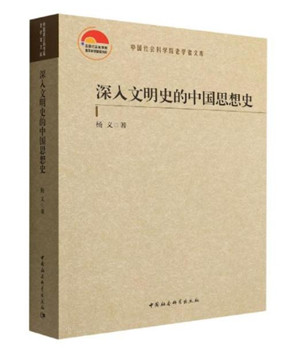
. > WHAT'S NEW > BOOKS
Innovative research on traditional Chinese thought
Author : GAO YUNQIU Source : Chinese Social Sciences Today 2023-09-07

Intellectual History Deep in the Chinese Civilization
Intellectual History Deep in the Chinese Civilization, by Yang Yi (1946–2023), a famous literary scholar and Member of the Chinese Academy of Social Sciences, offers a comprehensive synthesis of the history of Chinese thought, civilization, culture, and criticism. Yang’s research covers a wide range of Chinese thought, spanning from Chinese writer Lu Xun (1881–1936) to pre-Qin (prior to 221 BCE) scholars. Yang posits that the Chinese nation’s intellectual history is rooted in the history of literature, culture, and civilization, and any attempt to divorce intellectual history from these foundations merely results in a conceptual interpretation devoid of substance, akin to piles of empty scraps of paper.
In 2001, Yang raised the proposition of “remapping Chinese literature” and introduced literary geography as a research perspective and method. This broke with the original critical paradigm of Chinese literature with “historical events” as its main vein. Yang produced a “drawing book” of Chinese literature with historical time as a constant and geographical space as a variable.
In this unique drawing book, the initial step involved tracing back to the origins of history to uncover the seeds of civilization. Through meticulous examination of substantial literary texts, classics and documents, as well as the cultural tracing and verification of the environments and influences of sages and literati, Yang constructed a time series of his unique academic insights from Shijing [The Book of Songs], Chuci [The Songs of Chu], Han (206 BCE–220) poetic prose, Tang (618–907) and Song (960–1279) poetry, Yuan (1271–1368) opera, and Ming (1368–1644) and Qing (1644–1911) novels. The convergence of cultural forms within geographical space and the particularity of research objects in the time series continuously collide, presenting a multi-dimensional map of Chinese literature.
Drawing from his analysis of Tang poets Li Bai and Du Fu, Yang proposed an original approach to literary criticism known as multidimensional poetics theory. In Yang’s view, human consciousness of life is dynamic and manifests itself through the external expression of the connotation of life noumenon and human subjects. The main characteristic of this theory lies in the dominant cultural temperament of a group. Li Bai and Du Fu, as poets, possess an exceptional ability to radiate life. When they project their life to external texts and objects, they mark everything with their own distinctive brand. The true poet is in a special mental state in which characters and objects are combined into a new life. His identification of “culture–life” in Poetics of Chuci and discussion of Li Bai’s drunken-state poetics in Poetics of Li Bai and Du Fu integrate the pure aesthetic experience and the perspective of life sentiment, transcending the previous routine writing framework of literary history. Within the “life poetics” framework, Chinese “images” serve as indispensable underpinnings. This to a degree corresponds to Maurice Merleau-Ponty’s phenomenology of perception, broadening the research field of perception phenomenology in the traditional cultural vision of China.
Gao Yunqiu is a professor from the School of Literature at Hainan Normal University.
Ye Shengtao made Chinese fairy tales from a wilderness
Ye Shengtao (1894–1988) created the first collection of fairy tales in the history of Chinese children’s literature...
-
How northern ethnicities integrated into Chinese nation
2023-09-18
-
Mogao caves
2023-09-12
-
Mogao Grottoes as ‘a place of pilgrimage’
2023-09-12
-
Time-honored architectural traditions in China
2023-08-29
-
Disentangling the civilizational evolution of China
2023-08-28
-
AI ethics in science fiction
2023-08-23













 2011-2013 by www.cssn.cn. All Rights Reserved
2011-2013 by www.cssn.cn. All Rights Reserved